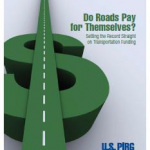Do Roads Pay For Themselves?
Setting the Record Straight on Transportation Funding
Highway advocates often claim that roads “pay for themselves,” with gasoline taxes and other charges to motorists covering – or nearly covering – the full cost of highway construction and maintenance. They are wrong. To have a meaningful national debate over transportation policy – particularly at a time of tight public budgets – it is important to get past the myths and address the real, difficult choices America must make for the 21st century.
Downloads
U.S. PIRG Education Fund

Highway advocates often claim that roads “pay for themselves,” with gasoline taxes and other charges to motorists covering – or nearly covering – the full cost of highway construction and maintenance. They are wrong.
Highways do not – and, except for brief periods in our nation’s history, never have – paid for themselves through the taxes that highway advocates label “user fees.” Yet highway advocates continue to suggest they do in an attempt to secure preferential access to scarce public resources and to shape how those resources are spent.
To have a meaningful national debate over transportation policy – particularly at a time of tight public budgets – it is important to get past the myths and address the real, difficult choices America must make for the 21st century. Toward that end, this report shows:
· Gasoline taxes aren’t “user fees” in any meaningful sense of the term – The amount of money a particular driver pays in gasoline taxes bears little relationship to his or her use of roads funded by gas taxes.
· State gas taxes are often not “extra” fees – Most states exempt gasoline from the state sales tax, diverting much of the money that would have gone into a state’s general fund to roads.
· Federal gas taxes have typically not been devoted exclusively to highways – Since its 1934 inception, Congress only temporarily dedicated gas tax revenues fully to highways during the brief 17-year period beginning in 1956. This was at the start of construction for the Interstate highway network, a project completed in the 1990s.
· Highways don’t pay for themselves — Since 1947, the amount of money spent on highways, roads and streets has exceeded the amount raised through gasoline taxes and other so-called “user fees” by $600 billion (2005 dollars), representing a massive transfer of general government funds to highways.
· Highways “pay for themselves” less today than ever. Currently, highway “user fees” pay only about half the cost of building and maintaining the nation’s network of highways, roads and streets.
· These figures fail to include the many costs imposed by highway construction on non-users of the system, including damage to the environment and public health and encouragement of sprawling forms of development that impose major costs on the environment and government finances.
To make the right choices for America’s transportation future, the nation should take a smart approach to transportation investments, one that weighs the full costs and benefits of those investments and then allocates the costs of those investments fairly across society.

